
Rekindle your Calm-charm
What do I mean by rekindle your Calm-charm? Do you know what a Calm-charm is? Did you know that you already have one? Everybody has one. Maybe you just forgot about it. Read More

10 suggestions to help you have a great work week
Wouldn’t it be great for you to walk into work on Monday morning feeling happy that you’re there and more at ease? Not that you walk in wondering which coworker was going to get on your nerves first? Wouldn’t it be nice to go to work feeling the way you feel if you were coming to work on a Friday? When it’s Friday, you feel happy, you are smiling, and you have got a pep in your step.
Here are 10 suggestions that you can use that will help you have a great work week.

10 suggestions to help you have a great work week- part 2
The seventh thing. At lunchtime, see if you can bring your favorite light lunch. When you eat a good meal, you feel good. Treat one of your coworkers out to lunch or make it a group lunch. Have lunch with your spouse, family member, or out-of-work friend. Be with someone you can talk with at lunchtime, have a good time, and relax. If you’re not able to do that, just go for a nice walk, get some fresh air, do some deep breathing. Listen to nice music.

Potential Points of Contact for Spread of COVID-19
Potential Points of Contact for the Spread of Covid-19
Like me, you still must go to work in this day of COVID-19. You are in a profession that can NOT close its doors or at least someone has to be there. That someone maybe you.
There are so many “opportunities” to spread disease that we don’t even think of. And even though we may not be able to 100% eliminate acquiring disease at work, there are certainly several ways we can decrease our risk of acquiring one. Read More

Decrease the Spread of Coronavirus Transmission at Work
As more companies are opening up, we all need to do our part to decrease the risk for spreading Coronavirus at work. There are many avenues to spread disease and we may not be able to successfully eliminate all possibilities, but we can focus on staying safe.

6 Ways to Avoid COVID Chaos
Many individuals are stressed, concerned and worried about COVID-19 as we struggle to adapt to this new normal. Many are thinking, do I have COVID? Or they hear that if you drink a certain tea or have a particular blood type, you cannot get the Coronavirus. There’s a lot of misinformation out there which is contributing to what I refer to as “COVID Chaos.”
Here are six ways to avoid COVID Chaos and reduce your stress during these tough times.
- Find reputable sources of information and news and don’t fall victim to false claims. I mean, if you want to be healthy, you’re going to eat healthy food, right? So if you want good information, you need to feed yourself good information coming from a qualified news source that’s based on science and medical facts.
- While it is important to stay informed, it’s also important that you don’t stay glued to the news all day long as that can increase your anxiety. Stay on top of the information but limit your viewing to two times per day and move on.
- The third thing is, once you start to feel this weight of the world and the way everything is going on, not just COVID, but race relations, a heat wave, tropical storms, COVID, bills, everything. That can totally be anxiety provoking. Go off to your quiet spot, even if it’s just for a couple of minutes. If you’re around other people, go to the restroom. That’s the one place, you know that you can be alone and by yourself for a few moments, where you can get it together and do some deep breathing. Breathing is an essential method for finding your calm.
- Follow recommended guidelines that are shared by the authorities who are studying this virus and doing the research behind it. The newest guidelines stress the importance of wearing a mask to reduce your risk and the risk of others. This should not be a political topic – this is a health and safety topic and we need to do our part of reduce the spread of the disease. And always wash your hands and use hand sanitizer to further protect yourself.
- Avoid crowds when possible – shop early in the day and always wear a mask. Many stores provide sanitizer to wipe down your shopping carts – utilize these when they’re provided.
- Get checked out. Now, what do I mean by that? Go ahead and contact your healthcare professional and see if you are actually at risk or if you actually need to be tested. There’s something to be said, for sure, about peace of mind. If you are at low risk and you’re still concerned, see if you can find a testing center, someone who’s conducting the test. There’s also telemedicine, where you can have the conversations online, to see if you should actually come in and get tested or go find some place to get tested.
During these tough times, let’s please try and help each other out and just do the right thing. Do right by each other. Be nice to each other. Together we can stay safe and healthy.
Relax Well!
Dr. Deitrick
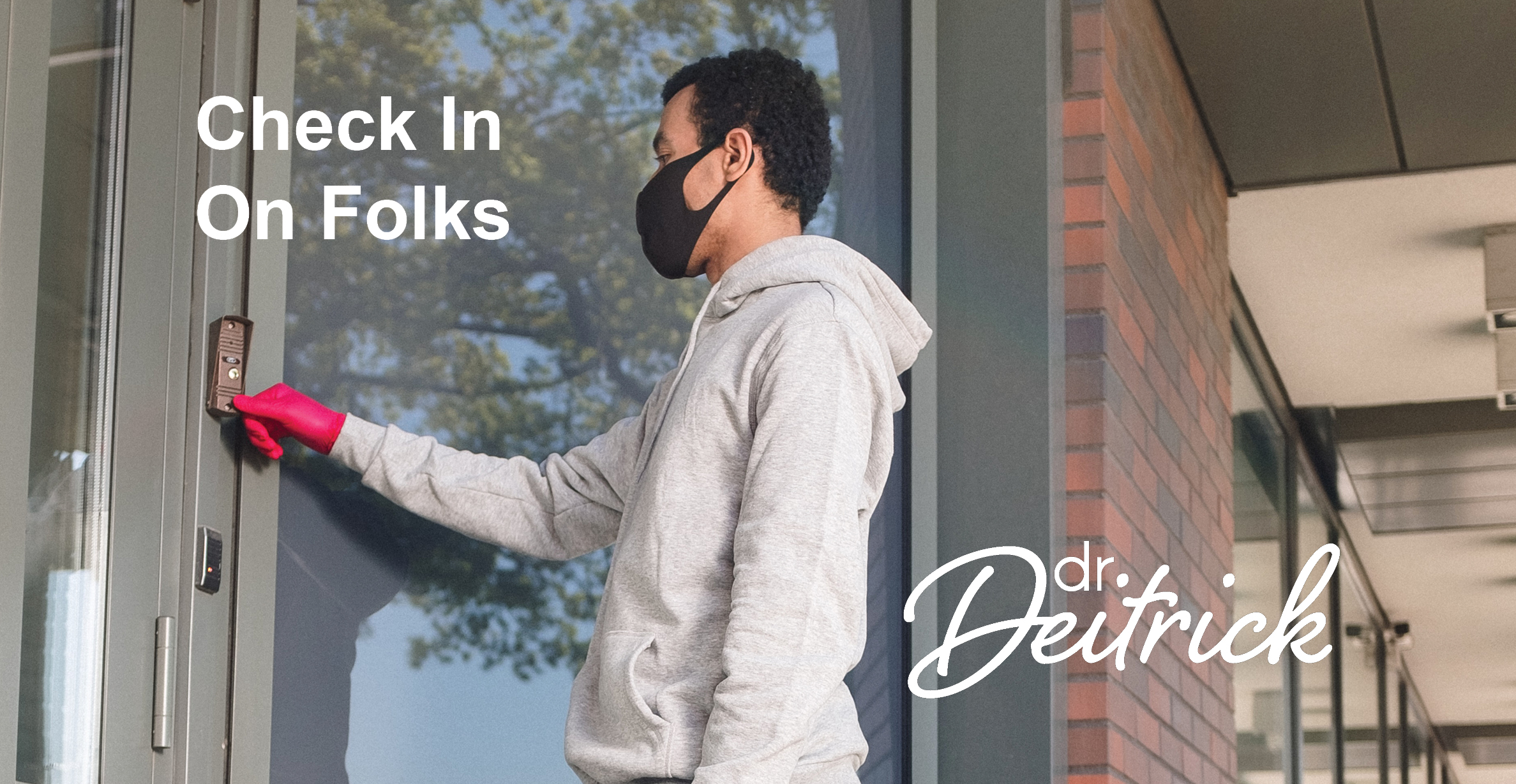
Check In On Folks
The other morning, I went to the store early to avoid crowds. I entered wearing my mask and noticed one of my elderly patients. She looked like she was having a hard time getting around walking with her cane and she wasn’t wearing a mask. I grabbed a cart for her and asked her where was her mask. She said, “I don’t have one.” Read More
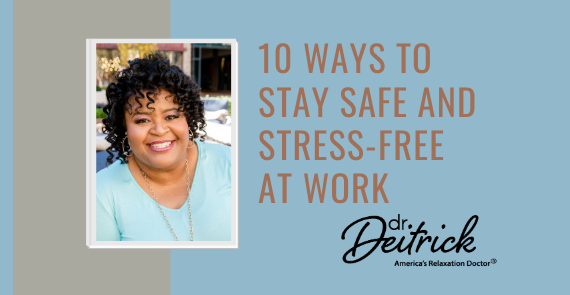
10 Ways to Stay Safe and Stress-Free at Work
10 Ways to Stay Safe and Stress-Free at Work
As a physician, I’ve needed to continue to go to work throughout the Coronavirus pandemic. You may also find yourself in the situation where you need to go into work and working remotely is not always an option. To help keep all of us safe at work, I’ve listed 10 ways to help reduce your anxiety during these uncertain times as well as staying safe.
- Breathe
The first thing is to breathe. I’ll say it today. I’ll say it tomorrow. I said it last year. I’ll say it in the coming years. Breathe. It’s the cornerstone of stress management as this is where you activate your parasympathetic nervous system, which is your body’s response when it’s in a relaxed state. You can take this benefit to the next level to meditate when possible, even if for only short periods of time. - Practice good hygiene
Practice good hygiene before you even get to work. Brush your teeth. Wash your body. Washing just not only helps you smell good, but it helps remove the dirt, bacteria, viruses, and all that stuff from your skin. - Prepare your own food
When possible, pack your own meals for work. This reduces your risk of coming into contact with the virus and will also reduce your anxiety by knowing you’re limiting your exposure. - Do your part to decrease spread of germs
Be mindful of what you’re touching or take precautions to touch only cleaned-off surfaces, or make sure you’re cleaning off those surfaces. For example, door knobs, coffee pots, etc. I have videos on my YouTube channel that covers this topic more in detail. - Move meetings/discussions to a virtual format
Help decrease your stress in this day of COVID-19 at work by having more virtual meetings or correspondences. In some work settings it may be hard to practice social distancing and remain six feet apart, so hold virtual discussions when possible. Even when everyone is in the same building, hold virtual meetings wherever possible. - Don’t give attitude
The sixth thing is, okay, it can be a little bit humorous, but it’s really true. The sixth thing is don’t give attitude, okay? Don’t fuel the fire. A lot of your coworkers, maybe even you, are on edge, and maybe feeling extra stressed. We all want to be safe. We all want to make sure each other is safe, especially in the work setting. I would just encourage you not to give attitude to your coworkers and don’t perpetuate falsity. If something is not 100% accurate, don’t just start rumors. Stick with facts and be supportive during these crazy times. - Be kind to coworkers
Be respectful, right? You know we’re all feeling the stress, okay? We’re all different walks of life. We all handle our stress in different ways. The last thing that we need to do is to turn on each other. My mom used to tell me, “There’s really no sink or swim. There’s only a swim or swim.” There’s no choice. We got to keep it moving. We got to be there to support other, and keep it moving, and protect each other. - Do your job then go home – don’t linger
Do your job admirably, and then go home. If there’s any other correspondences, maybe you all can text each other, or connect virtually. If there’s something that you need to do at work, you do your job. Minimize points of contact. - Work from home when possible
Employers are trying to find ways to keep workers safe and more are enabling their staff to work from home at times. Do your part and work remotely when possible. - Check out additional resources
Many of us find ourselves stressed at work, even before the COVID-19 pandemic. My book, Relaxed and Ready, shares insights on ways you can reduce your anxiety at work. I can’t see a better time not to pick up a copy for yourself, or you can give it as a gift for somebody who you know is stressing at work and need a little bit of help with that. Please visit relaxedandreadybook.com for a copy.
Just know that you are not alone. I’m not alone. We’re all not alone. I know in this day of Coronavirus, everybody is definitely on a big learning curve. Let’s continue to support each other during these challenging times and do our part. You can continue to find tips, motivational quotes and inspiration by following me on social media at @drdeitrickg. I look forward to staying in touch!
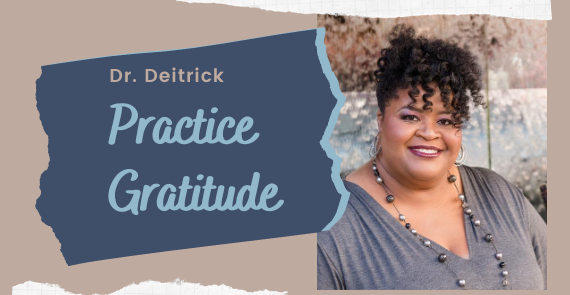
The Importance of Gratitude
What are you grateful for? I know there is a lot going on these days, and I imagine you have much to think about during these crazy times. But I would like for you to take a few moments just to focus on gratitude.
I realize there are many not-so-good things going on in the world. But think about it – it could always be worse. To give some perspective, remember that your ‘bad’ day could actually be someone else’s ‘good’ day. Even if your days are not the best lately, there’s still an opportunity to practice gratitude. Find in your heart that something or someone that you’re truly grateful for.
Also, remember that you’re learning, you’re growing, and most likely, gaining new perspectives. These developments are definitely something to be grateful for!
Have you ever just thought about jotting things down? This would include writing down what you’re truly grateful for – whether it’s simple notes or journaling. This is something that you can reflect upon when you may have one of your not-so-good days, and give you the chance to cherish that memory. This alone may lift your spirits and give you another opportunity to be grateful.
Some studies show that people who feel gratitude are often happier and experience less stress and anxiety. Every day presents the chance to practice feeling grateful. Why not give it a try? Relax Well!
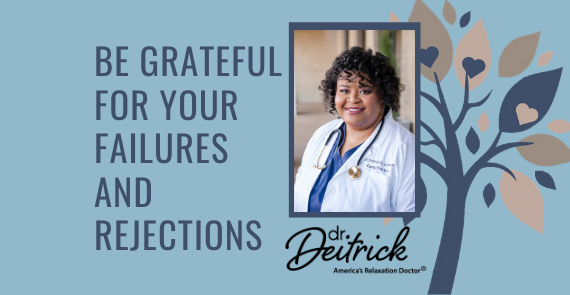
Be Grateful for Your Failures and Rejections
Relax and Be Grateful for your Failures and Rejections
What do I mean by relax and be grateful for your failures and rejections? Have you ever failed at something? Been rejected? Well of course you have. I know I have.
Things don’t always go as planned.
When this happens, how do you react?
At work, how do you feel when you don’t get the promotion or the project you wanted? Or maybe you were let go?
Yes, of course it’s going to hurt. You may be embarrassed, mad, shocked – experience your emotions.
After your anger, hurt, etc. subsides, you have a choices to make. Do you continue with your emotions, get upset, talk bad about everything – resort to poor coping mechanisms? Or do you take a deep breath, slow things down and think about things?
Ask yourself, “Do I have an opportunity to do something different. Is this just the blessing I needed to push me to go back to school or start my business, develop my passion?”
You remember in school when you may have failed or received a low grade on an important test? I know I have.
To gain acceptance into medical school you’re required to take the MCAT (Medical College Admissions Test). The first time I took the test, I received a low score. My feelings were hurt but I wanted to be a doctor. I took the test again and once more received a low score.
A close friend suggested that maybe I shouldn’t become a doctor. That really hurt. Even my college counselor mentioned that maybe I should pursue something else. But I knew I wanted to be a doctor.
Long story, short – I earned a competitive, passing score on my 7th attempt.
Once I entered medical school, I did fine on the exams and boards. If I let my MCAT failures stop me, I wouldn’t be a physician today.
I’ve also learned that failure or rejection in a relationship can also lead to something better. Years ago, I had just started to date someone and thought things were going well only to have him break up with me. I decided to look at this as a lesson and moved on. I ended up meeting my honey, Kasaly, who’s incredibly kind, funny, and full of love. The relationship has been a complete blessing.
I believe that people and situations in your life happen for a reason. They are teaching moments for all of us. Rejections are turning points and character building opportunities.
When you are dismissed by others, DO not to dismiss yourself.
Make your way, pave your road. The road may not be a straight line to your goal but relish the curves and the bumps and the journey because you’ve got this.
Be grateful that you are learning valuable lessons and getting to know yourself. You’re being released from situations or people that are of not going to uplift you. Just be grateful.
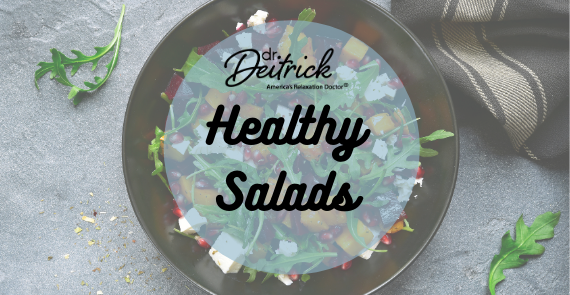
Reduce Stress Through Healthy Salads
Eating properly is key to staying healthy and reducing your stress levels. There are many foods which contain ingredients designed to support our body functions, boost energy and help us to feel better overall.
I like to recommend fresh, healthy salads, especially at lunch time, as they bring many benefits such as:
They make you feel good to eat it, they are a pick me up. They don’t weigh you down. So when you go back to work for the rest of your day, it doesn’t have to be a big production getting back to work.
- Thanks to the fiber in fresh salads, they help to promote regular bowel movements,
- They promote good gut health – depending what you put in them can contain many pre biotics, which are the foods that feed the good bacteria in your gut.
- They can help you with decreasing your daily caloric intake, as long as you don’t top your salads with a lot of extra meat and cheese and high-fat dressings.
- Fresh salads have many nutrients that your body needs to build and repair itself.
I encourage you to make your next lunch break more beneficial by eating a healthy salad while enjoying a relaxing activity such as coloring. I have a best-selling coloring book, Relaxed and Ready, that is designed to help calm your mind. Link here for more information.
Lastly, here is one of my favorite salad recipes – enjoy!
Dr. Deitrick’s Favorite Salad
Romaine lettuce
Purple onion slices
Blue Berries
Apple slices
Strawberries
Raw Garlic slices (1 clove)
Raw Jalapeno slices
Avocado
Black beans (plus or minus)
Balsamic vinaigrette (not a lot, just a couple of tablespoons)
Mix and enjoy.
Try a glass of fresh squeezed Lemon water for the drink (no sugar or sweetener) Umm mm
Talk about some good eating!
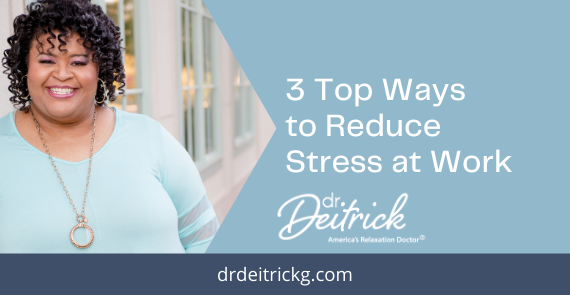
Top 3 Ways to Reduce Stress at Work
While many of us truly enjoy our work, sometimes aspects of our job can lead to stress and frustration. Here are three of my top suggestions to better manage stress at work:
1) Breathe – Breathing is the cornerstone of reducing stress. When you take a deep breath, it activates your parasympathetic nervous system which controls your rest, relax, and digestive response. When the parasympathetic nervous system is in a dominant state, you will start to feel calm as it tells your brain “you are safe.” Even if it’s for just 30 seconds, deep breathing will make a positive impact and help you to feel more calm.
2 ) Declutter Your Work Space – Organizing your work space will help you to focus, prevent you from wasting time in finding things, and will help you to alleviate stress. Keeping your work area free from clutter can also help promote creativity and productivity. If possible, try to straighten up your desk before heading home so you can start the next day feeling organized and ready to go.
3) “Mind Your Mind” – When I reference “mind your mind” I’m encouraging you to keep things in perspective and stay focused on the tasks at hand while at work. When you leave for the day, do your best to leave the work behind you. It’s also incredibly helpful to ensure you stay positive, be mindful of your responsibilities, and refrain from becoming involved in any office drama. When you leave work, release any negative energy you may be feeling and “keep work at work.” The opportunity to re-set and recharge will help you to enjoy your evening and will position you for success the following day.
Relax Well!
Dr. Deitrick

The Stress of Yes
The Stress of Yes – As humans, being agreeable is often a natural impulse. We want to help others as it’s often part of our core values. Plus, it helps to build trust, intimacy, friendships, good moments and more.
There are many reasons that people find themselves stressed out these days. We have a lot going on in our country and our world right now – we are definitely living in stressful time.
One of the ways we are adding to our own stress level is by saying “yes” to others when we don’t want to.
Let me explain.
There are times when we’re asked to do something or go somewhere and it’s actually something we really want to do. How do you feel? Excited? Happy? You may even be looking forward to it.
But what about the times when you are asked to do something, or go somewhere or try something, and it doesn’t sit well with you or you just don’t want to do it. Or how about this, you REALLY didn’t want to do it?
This situation can get tricky or stressful especially when you’re in a work situation and you commit to something that you truly don’t want to follow through on. It can also get complicated when you commit to a family member and later regret it.
In general, we tend to say yes in most situations because we want to please others, to be liked, want to avoid feeling guilty or are too scared to say no.
However, saying yes all the time can have some negative impacts:
- You’re adding to your stress and anxiety.
- You’re feeling overwhelmed, just taking on too much.
- Can leave you to feel extra tired and fatigued, just exhausted.
- You’re neglecting your own care as you reduce time to focus on your health and well-being.
Instead of saying yes all the time, try this:
- Say no! It’s a complete sentence.
- It is a freeing sentence, it can be finite.
- It’s a release of weight off of you.
- When you say no, now you are free to make choices about other things and other opportunities can be created.
- You can use your time for something else or to do nothing, it’s your choice.
- You can offer a reason for saying no. For example, say “Thank you for thinking of me for this, but I’m going to have to pass, I have other commitments and I don’t think I would be able to fully participate.”
- You can say maybe:
- This will give you time to think about it.
- Remember if you say yes there’s a consequence and if you say no there’s a consequence.
- This will buy you some time to weigh the pros and cons and then make your decision.
- Practice saying “No”
- Practice the conversation in your head so you can feel more comfortable when talking with the person.
- You can say yes, if you really want to, but remember that you may be opening yourself up to this commitment again down the road.
When it comes to the stress of saying yes, ask yourself – are you saying yes to become someone else’s image of you or are you being true to yourself?
It can take a lot of courage to say no, especially if you have been a people pleaser. But remember that your stress level and well-being matter too. Give yourself permission to say no. It gets easier the more you do!
Just a note, if someone says no to your request – just accept it and don’t trip. Don’t give attitude. Try not to take it personally and just respect their decision. You may even be able to learn from this experience for the next time someone expects you to say yes!
Relax Well!
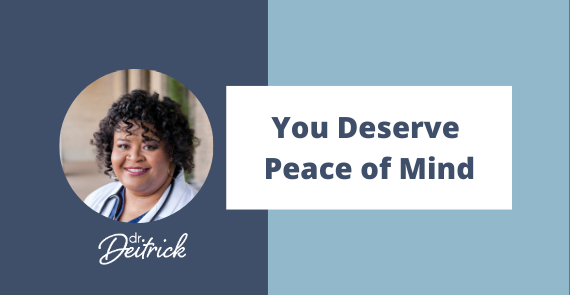
Peace Of Mind
You deserve peace of mind.
We are living in a stress filled, hustle and bustle chaotic time. Most of us out there definitely have stressors, some more than others. Some are “handling” them better or worse than others.
But in my opinion, not having peace of mind is one the biggest stressors. I mean constantly worrying about something, it’s a horrible feeling. I’ve been there.
Let me ask you what would it take for you to have peace of mind?
Peace of mind is the ultimate mental relaxation. Here are some suggestions to help you get there.
Ask, if you don’t know. Ask questions if you don’t know. It’s very stressful holding a question in that you truly need to know to make a decision or move forward, or have closure or if it’s something you can’t find the answer. Just ask it. Even if it’s something you may not want to hear.
Go as far as you can go. This is to tell yourself that you have done all that you know to do. That’s a weight off your mind. When you get to that point release it. Knowing you have done all you can do will help bring closure or resolution.
Trust your intuition. Trust yourself. We have ALL been there including me. Is there a little something in your gut or your mind that says nope, don’t do it? Or, yes, I think it will work. Go with your decision.
Walk in truth. Stay in peace. I know you have heard of this. For better or for worse the truth will set you free. The truth may hurt, the truth may be embarrassing, or ugly, or not. But the truth is the truth. It doesn’t have to be twisted or manipulated. It stands on its own whatever it is. When you can get to that point, this is peace.
Going back up to the other thought, ask questions. Once you know the truth, then you know.
We are all here on our individual journey, mistakes are bound to be made, flops, successes, poor judgments, great times poor times, all that. But again, it is what it is. It’s the truth. So walk in it.
Step away to think about it. When something happens to you. Especially if it’s devastating or impactful in your life, it can be very jarring. You may not be able to think clearly. So take some time to process and to think.
Run your race (Don’t compare)
- This can be a tough one. You are living your life and then you look to the right and see this person doing so well, they have it all and you want that.
- Or you look to the left and see another person doing something else that you admire.
- How about this – do your thing, run your race, let comparison go, just release that. What’s for you will be for you.
Help without expectations. What I mean by this is when you go to help someone or give someone money or a give a gift, you have to release that. It will experience stress if you expect someone to give right back after offering them your help. So help because you want to, but not with the expectation of receiving something in return
Let it go. What you can’t change, the past. What doesn’t serve you.
Forgive. Can you forgive yourself for something you did or didn’t do. Can you forgive yourself for what someone else has did or said something to you. Of course, only you can answer this. The answer may be yes or no. If you can’t, then ask yourself, what benefit is it serving you by holding on to it? Again only you can answer this. Have you heard of the saying that you forgive for you, not for them. It’s for your peace of mind.
I’m definitely not saying to forgive someone and then invite them to your next party, that will be only up to you. I am saying to release it.
Try not to fall into the guilt trap
- This can be a tough one for some folks.
- Just don’t be made to feel guilty for something you don’t want to do
- Think of simple – Most of these things discussed is giving up control. Right of others actions or situations that you cannot change. When I mean simple I mean don’t try to fix or finagle or contort things. Accept something for what it is.
- Prepare
– Work toward a reserve fund
– Get affairs in order
– Prepare for emergencies
– Once you prepare for things it can
We never know what a day will bring. We do not know who is going to enter our lives or what others are going to do to us. The only thing we can do is work on creating our own solace and calm.
Work what you can do to give you peace of mind.
In my mind, having unconditional self-love, good health, and peace of mind are pillars of relaxation. Take care of yourself, you deserve it. So every single day think about this. When I you to bed tonight, will you be wide awake because of worrying about something you can’t control, or are you working towards peace and restful sleep.
I know that all of the things I just mentioned are not easy, but they are necessary if you want to gain peace of mind and how you will achieve it. Just keep going and claim it.

Health Benefits of Relaxation
Why It’s Important to Make time for Relaxation – It Benefits Your Health!
Most of us realize that we need to do a better job in reducing our stress levels. But as we juggle multiple responsibilities in our daily lives and strive to stay on top of our never-ending “to do” lists, our thoughts of self-care frequently fall by the wayside.
As a board certified family medicine doctor, I have a solid understanding of the negative effects of chronic, unmanaged stress. From depression to poor digestion, the impact of stress can take its toll.
On the flip side, there are many benefits when you devote attention to reducing your anxiety and focus on healthy behaviors leading to a more calm approach to life.
A few examples include:
Physical Effects:
-Decreased blood pressure
-Decrease heart rate
-Decrease breathing rate
-Improved digestion
-Improved blood sugar control
-Improved blood flow
-Decreased pain
-Improved healing
Mental Benefits:
-A better attitude
-Improved concentration
-Decreased anger
-Decreased frustration
-Improved confidence
These are just a few ways that incorporating more relaxation in your life can enable you to make significant improvements, both mentally and physically. The next time you avoid allowing yourself to take a much needed break, I encourage you to think of the many positive outcomes you’ll enjoy by practicing self-care and finding your ‘calm.’
Your mind and body will thank you!
Relax well!

The Benefits of Coloring
Color Me Relaxed – The Benefits of Coloring
I frequently suggest to people to try adult coloring books to help reduce stress. Most people will say “I’m an adult,” or “I’m too busy,” and “I don’t have time to color.”
There are a many benefits of coloring and you don’t have to be a child to enjoy coloring and reap the rewards. In fact, there is quite a bit of research showing that coloring is helpful for adults.
Studies have shown that for some, coloring can provide the same benefits of meditation. Per Merriam-Wester, meditation is defined as:
1) to engage in contemplation or reflection.
2) to engage in mental exercise (such as concentration on one’s breathing or repetition of a mantra) for the purpose of reaching a heightened level of spiritual awareness.
Taking this one more step, what do you do when you color? You are focusing on one thing (coloring), it forces you to be in the moment, you can block other things and just focus on that activity.
I recommend that people incorporate coloring when they can. For example, if you’re having a stressful day at work, spend a few minutes coloring on your break to help you to focus your mind and start feeling relaxed.
After all, the benefits of coloring are numerous. Here are just five examples:
1. Decreases stress – It relaxes your mind while you are engaged in creating your picture.
2. Decreases anxiety – For your next work break, try coloring at your desk or outside. You can also eat your lunch while coloring.
3. Brings out positive emotions – In color therapy, certain colors stimulate different emotional responses or feelings. For example the color blue is associated with feelings of calm, security and trust and yellow is associated with happiness.
4. Great coping mechanism – It’s a much healthier way to deal with stress versus unhealthy coping mechanisms such as overeating, undereating, tobacco use, etc.
5. Enhances creativity – Coloring actually activates the part of your brain called the frontal lobe which is helpful for problem solving, creating and focusing (among other things).
I encourage you to try this beneficial activity to reduce your stress and anxiety. Happy coloring!

Holiday Giving From the Heart
Give From the Heart – No or Low Cost Gift Ideas
The holidays are here. It’s a time of year for giving thanks, feeling good, doing good for others and having a good time.
But many people often find this time of year stressful and this often stems from overextending themselves by purchasing gifts. Trying to decide what to give, and how much to spend can create anxiety rather than joy.
Here are some suggestions for gifts for your cherished loved ones, including close friends and family.
Create something from your heart to give.
One thing I can recommend is a coupon book. Some of you may remember creating these when you were young. So fun to make. You can even make a special one for your spouse (spice it up!).
Create a coupon book where the person tears off the coupon and receives that special ‘gift.’
Some gift ideas include:
– A foot massage or back rub
– Remote Control “master” for the day
– A dinner out or take out
– Game night
– Wash their car
– Breakfast in bed
– Do a load of laundry for them
It can literally be what ever you want – You can even put an expiration date. It’s really fun to make and to give!
Scrapbook
Create a special scrapbook with memories that are meaningful to the person. For example, if you have an older or adult child, you can put together select photos, letters, artwork and other mementos for them to enjoy for years to come.
Homemade Craft
If you are a crafty person, create a gift by knitting something, making a piece of jewelry, use a craft or painting kit. A handcrafted gift is always appreciated.
Write a letter
Write a letter to a friend or loved one telling them exactly how you feel about them, or something you remember about them such as how you met or a funny moment that you shared.
Give an Experience
Give the gift of information, transformation or education. Enroll in an online class together (it can be a free class), or give a book that changed your life with a note sharing how it affected you. Share a favorite recipe and make it for them. Offer to go on a weekly walk together as part of a New Year’s resolution. There are many possibilities!
In my opinion, the holidays should be about loved ones, showing love and gratitude, and sharing gifts as a token of appreciation and kindness. The holidays shouldn’t be stressful. I hope this gift idea list will inspire you to approach the holidays a little differently this year.
Giving physical gifts is perfectly fine, but should not define how much you care about someone. Giving from the heart is all that matters. Happy Holidays and Relax Well!

A Calm Mind is a Receptive Mind
In this day that we are living in, things are not only very stressful, but seem to move very fast. We barely have time to think, and when we do, we have to do it quickly. But when we have to think quickly, sometimes mistakes are made, feelings get hurt or we can make poor choices.
Even in the midst of a fast-paced situation, if you can take the time to calm your mind, you can improve the quality of your life.
So what do I mean by that? What do I mean by the phrase A calm mind is a receptive mind?
Let’s break statement down.
To me, ‘calm’ means relaxed, tranquil/quiet, non-chaotic.
‘Receptive’ means to be open, capable of receiving.
In my humble opinion when your mind is calm, it is open and receptive to many things and possibilities.
What things can a calm mind be open or receptive to? A few examples:
- Learning
- Thinking
- Ideas
- Love
- Problem solving / resolution
- Listening
- Compromise
- Respect
- Understanding
- Effective communication
Have you noticed that when you’re in an argument with someone and you are on the defensive, do you notice that while you hear the person speaking, you may not actually be ‘listening’ to what they are saying? When in a blocked or defensive mode, we typically don’t listen and we’re not receptive to others’ thoughts.
In addition, when we have fleeting thoughts, are feeling inpatient or are generally feeling angry, we don’t have the ability to think clearly. This leads us to sometimes make errors and poor decisions.
But if you can find a way to shut that down all that mind chatter, to calm your mind, and be open to listening to another point of view and even if you don’t agree, that disagreement will be based on clear thinking and not just rush to judgment and condemnation.
How do you calm your mind especially when you are in an acute situation? Here are five suggestions:
- If I’ve said it one I’ll say it 1 million times – BREATHE. There is something about taking in deep breaths and blowing out frustration, anxiety, chatter, fear all of those negative and non-productive feelings out.
- Guided meditation – think of something you love and focus only on that. Channel this love. Think of peace harmony, contentment, happiness, no worry, calm. Smile if you have to. But activate those feel good hormones!
- Talk to yourself, even if it’s out loud, calm yourself down. I don’t mean in a creepy way, but for example when I am nervous I say something like: Deitrick – You can do this, Deitrick – you are fine, Deitrick – just breath. Or if you have a favorite scripture or saying that calms you down, you should speak it. Use positive affirmations.
- Look at something that you are curious about. When you look at something out of curiosity, all of your attention focuses on that particular thing. And when your attention becomes focused, your mind cannot think about the stressful thoughts that cause you to feel stressed. So your mind relaxes and in return relaxes your body.
- Practice Gratitude – When you take a brief moment to be thankful for who you are at this time, where you are, what you may have in your life, there isn’t another way to go except to be calm. Even if you are catching it right now. Take a moment to be grateful for what you do have. It can be worse. Even though it may not seem like it. It really can be. But find something grateful to be about. Write down 5 things on a paper. When you aren’t feeling particularly well or grateful. Look at it and remind yourself, you do have something to be grateful for.
To summarize:
To help calm your mind:
- Breath
- Meditate
- Talk to yourself
- Look at something you are curious about, right now
- Practice Gratitude
I hope some of these suggestions will be helpful to you and relay the importance of trying to have a clear and calm mind. These are just a few. Try to be conscious of your thoughts. Your thoughts are powerful. When your mind tries to take you to a place of disorder, anxiety, chaos, fear, remember that thoughts and actions coming from that state of mental being, and they are not productive nor do they make your mind receptive. Do your best to calm your mind. Please remember a CALM mind is a Receptive Mind.

Pre, Pro & Post Biotics – How They Benefit You
When you have digestive issues and stomach pain, this can be stressful. In my opinion, your bowels are where all the good stuff happens. Your body is able to break down the food we eat and then take it back in to help our bodies repair/heal, grow and sustain us.
I’m going to share a quick background of our digestive health and how pre, pro and post biotics play a role.
Let’s start with microbiome, which is the genetic material of all the microbes – bacteria, fungi, protozoa and viruses – that are in our body and helps us to break down our food.
Here are some reasons your microbiome can change and in turn, affect your health:
- Your diet or change in diet
- Medication
- Disease (diabetic)
- Illness
- Stress level
- Alcohol
- Hydration status
- Mentation- yes there is a phenomenon call the gut-brain axis and that means that the brain and the gut are very much connected. Some say the gut is the second brain. Studies show that people with anxiety or depression can alter the microbiome.
How do you know if you have improper digestion?
- Bloating
- Burping
- Constipation
- Gas
- Nausea
- Feeling Full
- Fatigue
I’m sure you’ve heard the term Probiotics – Here’s a closer look:
Pro means supporting
Biotics means life or living
Probiotics are basically good bacteria. There are different bacteria located in our intestines and the good bacteria helps us to stay healthy, helps digest food, attacks the bad bacteria, and keeps things moving.
Where do we find these good bacteria?
- We have some already in our gastrointestinal system
- Supplements that we can purchase
- The food we eat
Some food options includes
- Yogurt
- Fermented Cheeses, Such As:
- Gouda
- Cheddar
- Swiss
- Parmesan
- Fermented Vegetable Products, Such As:
- Miso
- Sauerkraut
- Pickles
- Pickled vegetables (Non-Pasteurized)
- Kefir – a fermented milk drink
Olives
Kombucha is a fermented tea packed full of antioxidants and probiotics
Kimchi it’s a Korean dish It is made from vegetables, most often cabbage, which are fermented with bacteria and flavored with Korean red pepper
If you want to take a probiotic dietary supplement, there are plenty of commercial products to choose from. Look for supplements that have:
- Live cultures don’t forget they need to get through the harsh environment of the stomach, so they need to be formulated to withstand the stomach acid. A lot of them do not.
Prebiotics – “Pre” is before Biotics (Life or Living).
PREBIOTICS are a type of NON digestible fiber that are fermented and used for fuel BY the beneficial bacteria in your gut.
Examples of prebiotics are
-Lentils, chickpeas and beans
-Oats
-Onions, Leeks, Garlic (RAW)
-Nuts
-Asparagus
-Bananas (Under-Riped)
-Jerusalem Artichokes
-Chicory Root
Prebiotics has been linked to a long list of powerful benefits, including:
- Lower risk for cardiovascular disease
- Improved digestion
- Lower stress response
- Higher immune function
- Lower risk for obesity and weight gain
To sum it up, PRO biotics are the actual healthy bacteria. They help swing your overall intestinal balance so that the bad bacteria is prevented from overpowering your system and causing disease. They are found in fermented foods.
PRE biotics are the foods or non-digestible fermented foods that ‘feed’ the Probiotics (good bacteria). It’s beneficial to take prebiotics AND probiotics. Always best to obtain these in the form of food – use supplements only if you can’t get sufficient amounts through eating.
Postbiotics
Postbiotics are essentially the byproducts of probiotics. They eat food, it ferments in the gut, and then it creates the postbiotics.
Some benefits of Postbiotics:
- Supports your immune system
- May help to prevent Type 2 diabetes
- May help with diarrhea issues
Postbiotics is still a relatively new concept and one that you’ll be hearing more about. So stay tuned! In the meantime, I encourage you to ensure you’re including plenty of pre- and pro-biotics in your daily diet!

Boldly Walk Through Your Fears
How many of ya’ll out there feel that you aren’t fully living your life because you are scared? What are you scared of?
Are you scared of failure? Are you scared of being judged? Are you scared of rejection? Are you scared to go back to school because you feel you’re too old? Afraid to wear certain clothes? Are you scared to give a presentation because you may stumble over your words?
Worse yet, are you scared to succeed? There are people out there who are scared to succeed, consciously or subconsciously. Because after they succeed, then what? Their goal may be reached. They won’t know what to do or to how to fully step into their success. So because of that, they may not move forward.
Some people get comfortable with the struggle, with the complaining about not making it, with the lack, because it gives them something to talk about, about how they want to succeed. But deep down they are scared.
So many of us are not living our full potential or experiencing all the wonderful things that living can offer.
Because of fear.
Let’s look at this from a different perspective. If you fail, look at the experience you gain:
- If you are rejected, there could be a different and better opportunity waiting for you.
- If you make a mistake giving a presentation, we’ll join the club! People will still enjoy your presentation and content!
Walking through fear is all about building your life’s story.
Imagine this: You’re toward the end of your life and someone asks ‘How was it?’ Do you say “It was fine but I was too scared to get out of my comfort zone?” Or do you say, “Wow! I pushed myself outside my comfort zone and had some amazing experiences!”
Try your best to overcome your fears. As many will tell you, their biggest regrets are the things they didn’t do and not the things they did. Start today and boldly walk through your fears!
Relax Well.

Thrive in a Toxic Work Environment
In an ideal world, we’d all come to work where everyone is happy to see each other, you get along, and everything runs smoothly. However, what many people face in their daily work life is quite a different story. Sometimes the work environment can be toxic. What do I mean by toxic?
A toxic work environment is often described as having these characteristics:
- Lots of drama
- Infighting among staff
- Lack of direction, clarity and focus
- Passive-aggressive communication
- High employee turnover
Oftentimes, we’re not in a position to change jobs or we may want to stick with our job to see if there will be changes in leadership and/or direction down the road.
If you need to stay in a toxic work environment, here are six ways to best cope:
- Come up with ways to decrease your stress while you are at work. When it is becoming too unbearable, utilize stress-reduction strategies at the office.
- Don’t contribute to the drama – don’t get involved in the office drama or gossip. Even if it’s about you! Keep your calm, don’t engage. It doesn’t say that you are weak, but it proves that you are strong!
- DO your work. You were hired to do a job. Do that job and do it to the best of your ability.
- Keep it in perspective – you are at your place of employment to do a job. You are supposed to be there for a certain number of hours. When it’s time to go home – leave. And leave the work problems behind you.
- Find a person or people that you genuinely connect with.
- Plan an exit strategy, if you must.
I would never EVER advise to walk off of a job, unless you are physically in danger. If you must leave, you need to do it strategically. Evaluate your finances, create an action plan and be prepared in case it takes you time to find a new source of income.
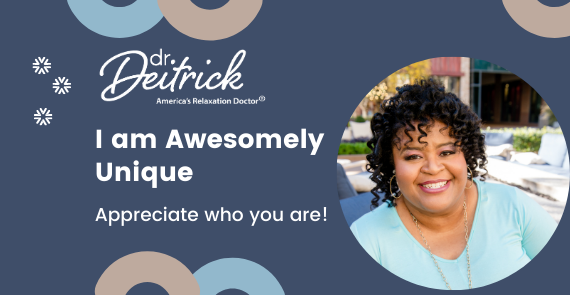
I Am Awesomely Unique!
When you were born, there has never been anyone else like you. You are totally unique! You were born with a unique gift to share.
It’s important that you learn to love yourself and celebrate your uniqueness. This will enable you to discover your special gift that you can share with others. Remember – you are awesome!
I encourage you to take a moment and write yourself a letter. Describe what’s going on in your life, what and how you’re feeling and what you hope to accomplish over the next few weeks, few months or the next year – whichever timeframe feels right to you. When you’re finished writing, put it in an envelope, seal it and mark on the front when you should open it. You’ll enjoy the chance to review this information and celebrate your progress when you read your letter down the road.
I also suggest journaling. My Grateful and Ready Journal: A Reflective Journal to Fuel Your Soul enables you to document what you’re grateful for each day and focus on areas of your life that you can celebrate. It’s a great way to set your goals, acknowledge your growth and reflect on important aspects of your life. Remember – you are unique and have special gifts to share. Thank you for being you!
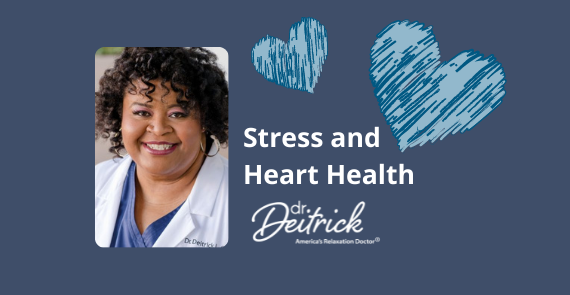
Stress and Heart Health
Did you know that heart disease is the number 1 killer for American Adults! Did you know that chronic unmanaged stress can hurt your heart?
We all face stressful events throughout our lives. Some individuals can successfully navigate stress and it doesn’t have a long-lasting impact. However, many people have a tough time managing stressful situations that pop up and they suffer from prolonged, unmanaged stress.
It’s important to understand what sustained stress can do to the body, for example, heart health.
When the body is facing stress, an adrenaline rush can occur which causes:
-An increased heart rate as the body enters a ‘fight or flight’ response
-An increased breathing rate
-A rise in blood pressure
If our bodies go into this stressful state on a frequent basis, it can negatively impact our heart health. According to the American Heart Association, more research needs to be done on this subject but they have found that individuals who face ongoing stress are more susceptible to poor health habits that have a significant impact on our heart.
Examples include:
-Increased consumption of alcohol
-Binge eating
-Poor sleeping patterns
-Chronic fatigue
-Inability to calm the mind and focus
-More susceptible to taking illegal drugs
-Lower immunity
These behaviors can dramatically affect one’s overall health including their cardiovascular system. Unmanaged stress has multiple effects on our body’s overall health and ability to feel our best. Not to mention the emotional and mental impacts.
It is of the utmost importance to find productive ways to manage your stress before something happens.
As a board certified family medicine physician I encourage everyone to pay attention to how you are reacting to the stress in your life. If you enjoy videos, my YouTube channel has dozens of short, informational videos covering stress, stress management strategies among other useful topics. Visit my channel youtube.com/drdetirckg and you can also check out my books here.
Relax Well,
Dr. Deitrick
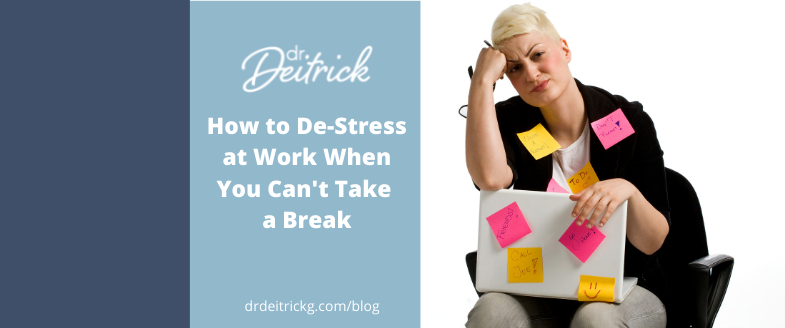
How to DeStress at Work
How to Destress at Work When You Can’t Take a Break
We are supposed to have a break when we are working….right? This is a time to recharge, relax, use the restroom, just get our thoughts together. We look forward to taking that lunch break, that walk or that mini escape from the job.
But the reality of it is, is that we don’t always get that break.
Many jobs out there don’t have scheduled breaks and they just have to keep it moving. This can definitely add to your stress.
I want to share with you 5 ways you can take a break if you can’t take a break.
1. Use the restroom. This one is really non-negotiable. You have to use the restroom. You just have to. Your body is telling you that you have to eliminate. Listen to it. Unless there is a life or death situation right now, please don’t hold it. When you hold it, it increases your anxiety, you just can’t think straight. Now while you are in the restroom for ever how long, take five deep breaths. Cherish this alone time, forever how short.
2. Look at your watch to count down the time. More than likely if you are unable take a break that means you are very busy right? A lot of the time, time flies and before you know it, it may be close to getting ready to be done for the day. So take a look at your watch to see how much longer you have until you can go home and be with your loved ones, or pets or out with friends. Give your self a smile by looking forward to doing something when it’s time to leave work.
3. Close your door. If you have an office and it’s time for your break and you still need to get things done. Doing something a simple as shutting your door for a lunch can help. You can “close off” the outside for the time being. This is what I do the most. I turn on my music too when I can.
4. Talk to yourself
- Say your positive affirmations in your mind.
- Say a couple of your goals in your mind, to keep you motivated and focused.
5. Last and most important, no matter what you are doing… take deep breaths. This is designed to help calm your mind, calm your breathing, decrease anxiety and help you reset.
Bonus idea: Stretch
1. Right where you are drop your head towards your chest and stretch those neck muscles.
2. Raise both your arms over your head and reach for the ceiling.
3. Twist at your waist side to side and bend.
4. Lift your legs one at a time or do some lunges.
I encourage you to try these suggestions the next time you’re unable to take a break at work.
For additional stress reduction tips, please join my weekly Relax Well Facebook Livestream every Wednesday at 8pm CST. Link here. My Youtube channel also offers many informational videos. You can visit my channel here.
Relax Well!
Dr. Deitrick

Magnesium to Fight Stress
When it comes to stress, there are multiple factors that can play a role but one area that is sometimes overlooked is nutritional deficiencies. When working with patients who are experiencing symptoms that can be caused by stress, I’ll run a series of labs to rule out various physical causes. If their labs come back normal, I’ll take a closer look at a patient’s life including their eating and nutritional habits.
In some cases, a deficiency in Magnesium can result in individuals’ increased stress and anxiety. Let me explain.
Magnesium is a mineral found in the earth, sea, plants, animals and humans. Magnesium is important for many processes in the body, including regulating muscle and nerve function, blood sugar levels, and blood pressure and making protein, bone, and DNA. (Source: National Institutes of Health).
In addition, Magnesium plays a role in activating our body’s parasympathetic nervous system, which tells your body that ‘everything is okay’ and promotes relaxation. You can feel the effects of the parasympathetic nervous system when you take deep breaths – that too will help put your body into a calm state. Magnesium also influences the activity of GABA, the main inhibitory neurotransmitter in the brain that is intricately involved in anxiety.
Other benefits of magnesium:
- Neutralizes stomach acid
- Helps with brain health
- Good for bone health and can help prevent osteoporosis
- Helps the body break down sugars and might help reduce the risk of insulin resistance (a condition that leads to diabetes)
A deficiency in magnesium can cause:
- Loss of appetite
- Nausea or vomiting
- Fatigue and weakness
- Muscle contractions and cramps
- Personality changes
- Abnormal heart rhythms
While more studies are needed, magnesium has been shown to help reduce headaches, including migraines. A lack of magnesium has also been linked to a greater risk of depression.
How much magnesium do you need per day?
According to the National Institute of Health, women need 310-320 mg per day while men need 400-420 mg.
Source of magnesium include:
- Legumes, nuts, seeds, whole grains
- Green leafy vegetables (such as spinach)
- Fortified breakfast cereals and other fortified foods
- Milk and yogurt
While it’s best to obtain your minerals and vitamins from food sources, you can take a supplement if you feel you are deficient.
If you have facing chronic stress, I encourage you to incorporate strategies that promote stress reduction to help you achieve a healthier life. Your nutritional intake should also be a consideration including a possible deficiency in magnesium. Relax Well!
Please note: This information is for educational purposes – before taking any supplement including magnesium talk with your doctor.